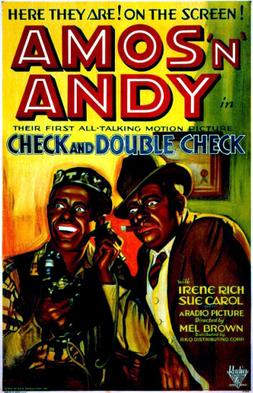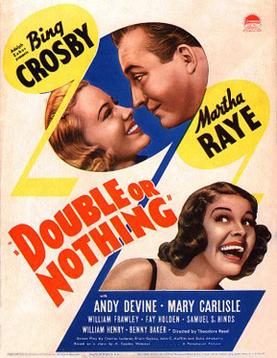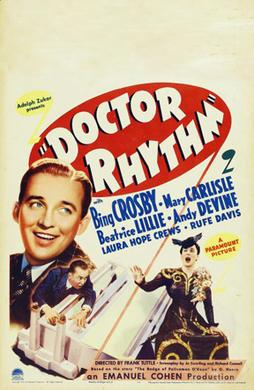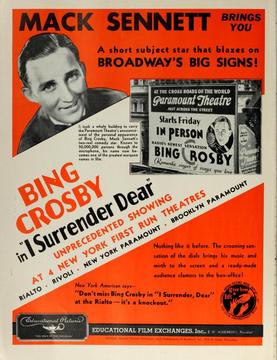Related Research Articles

Harry Lillis "Bing" Crosby Jr. was an American actor, singer, television producer, television and radio personality, and businessman. The first multimedia star, he was one of the most popular and influential musical artists of the 20th century worldwide. Crosby was a leader in record sales, network radio ratings, and motion picture grosses from 1926 to 1977. He was one of the first global cultural icons. Crosby made over 70 feature films and recorded more than 1,600 songs.

Ruggiero Eugenio di Rodolfo Colombo, known as Russ Columbo, was an American baritone, songwriter, violinist, and actor. He is famous for romantic ballads such as his signature tune "You Call It Madness, But I Call It Love" and his own compositions "Prisoner of Love" and "Too Beautiful for Words".

Check and Double Check is a 1930 American pre-Code comedy film produced and released by RKO Radio Pictures, based on the Amos 'n' Andy radio show. The title was derived from a catchphrase associated with the show. Directed by Melville W. Brown, from a screenplay by Bert Kalmar, J. Walter Ruben, and Harry Ruby, it starred Freeman Gosden and Charles Correll in blackface, in the roles of Amos Jones and Andy Brown, respectively, which they had created for the radio show. The film also featured Duke Ellington and his Cotton Club Orchestra.

King of Jazz is a 1930 American pre-Code color musical film starring Paul Whiteman and his orchestra. The film title refers to Whiteman's popular cultural appellation. At the time the film was made, "jazz", to the general public, meant jazz-influenced syncopated dance music heard on phonograph records, on radio broadcasts, and in dance halls. In the 1920s Whiteman signed and featured white jazz musicians including Joe Venuti and Eddie Lang, Bix Beiderbecke, Frank Trumbauer, and others.

Bing: A Musical Autobiography was Bing Crosby's fourth Decca vinyl LP, recorded and released in 1954.

The Rhythm Boys were an American male singing trio consisting of Bing Crosby, Harry Barris and Al Rinker. Crosby and Rinker began performing together in 1925 and were recruited by Paul Whiteman in late 1926. Pianist/singer/songwriter Barris joined the team in 1927. They made a number of recordings with the Whiteman Orchestra and released singles in their own right with Barris on piano. They appeared with the Whiteman orchestra in the film King of Jazz, in which they sang "Mississippi Mud", "So the Bluebirds and the Blackbirds Got Together", "A Bench in the Park", and "Happy Feet". They are best remembered for launching Crosby's solo career, one that would make him the greatest song charting act in history and one of the most influential entertainers of the twentieth century.

Every Night at Eight is a 1935 American comedy musical film starring George Raft and Alice Faye and made by Walter Wanger Productions Inc. and Paramount Pictures. It was directed by Raoul Walsh and produced by Walter Wanger from a screenplay by C. Graham Baker, Bert Hanlon and Gene Towne based on the story Three On a Mike by Stanley Garvey.

Harry Barris was an American popular singer and songwriter. He was one of the earliest singers to use "scat singing" in recordings. Barris, one of Paul Whiteman's Rhythm Boys, along with Bing Crosby and Al Rinker, scatted on several songs, including "Mississippi Mud," which Barris wrote in 1927.

Al Rinker was an American musician who began his career as a teen performing with Bing Crosby in the early 1920s in Spokane, Washington. In 1925 the pair moved to Los Angeles, eventually forming the Rhythm Boys trio with Harry Barris.

Gus Arnheim was an American pianist and an early popular band leader. He is noted for writing several songs with his first hit being "I Cried for You" from 1923. He was most popular in the 1920s and 1930s. He also had a few small acting roles.

Double or Nothing is a 1937 American musical comedy film directed by Theodore Reed and starring Bing Crosby, Martha Raye, Andy Devine, Mary Carlisle and William Frawley. Based on a story by M. Coates Webster, the film is about a dying millionaire who instructs his lawyer to drop twenty-five purses on the streets of New York City, which are found and returned by four honest people. According to the will, each of them is given five thousand dollars, which they must double within thirty days in order to claim one million dollars. Greedy relatives, who were cut from the will, try to thwart each one's plans. The film features the popular song "The Moon Got in My Eyes".

"Mississippi Mud" is a 1927 song written by Harry Barris, first sung by Bing Crosby as a member of Paul Whiteman's Rhythm Boys. Its musical composition entered the public domain on January 1, 2023.

The Brox Sisters were an American trio of singing sisters, enjoying their greatest popularity in the 1920s and early 1930s.
Charles Rinker was an American lyricist who worked frequently with Gene de Paul and Bob Rothberg, among others. His older brother, Al Rinker, was one of the famous Rhythm Boys with Bing Crosby in the late 1920s. His sister, Mildred Bailey, was a popular and influential American jazz singer during the 1930s.

Doctor Rhythm is a 1938 American musical comedy film directed by Frank Tuttle and starring Bing Crosby, Mary Carlisle, Beatrice Lillie, and Andy Devine. Based on the 1907 short story The Badge of Policeman O'Roon by O. Henry, the film is about a doctor who pretends to be a policeman assigned as the bodyguard of a wealthy matron, whose beautiful niece becomes the object of his affections. The film features the songs "On the Sentimental Side" and "My Heart Is Taking Lessons".
"At Your Command" is a 1931 song recorded by Bing Crosby on June 24, 1931 with piano accompaniment by Harry Barris. The lyrics were written by Bing Crosby and Harry Tobias, The music was composed by Harry Barris.

Confessions of a Co-Ed is a 1931 American drama film starring Phillips Holmes, Sylvia Sidney and Norman Foster, and featuring a rare onscreen appearance by the musical Rhythm Boys. The picture was directed by David Burton and Dudley Murphy, and the convoluted plot involves a college student who marries the wrong man then grapples with a dilemma when the actual father returns. At the beginning of the movie, Crosby, Barris and Rinker perform the fast-paced "Ya Got Love" at a fraternity party after Crosby sings his current hit "Out of Nowhere."
Gordon Clifford was an American lyricist who wrote music for Hollywood films in the 1930s. His best-known songs include Nacio Herb Brown's "Paradise", Alfred Newman's "Who Am I?" and Harry Barris's "It Must Be True" and "I Surrender Dear".

Loyce Whiteman (1913–1989), also known as Lois Whiteman, was an American popular singer.

I Surrender Dear is a 1931 Educational-Mack Sennett Featurette starring Bing Crosby and directed by Mack Sennett. This was the first of the six short films Crosby made for Sennett and which helped launch his career as a solo performer.
References
- ↑ Giddins, Gary (2001). A Pocketful of Dreams . New York: Little, Brown and Co. p. 224. ISBN 0-316-88188-0.
- ↑ Macfarlane, Malcolm (2001). Bing Crosby - Day by Day. Lanham, Maryland: Scarecrow Press. pp. 63–64. ISBN 0-8108-4145-2.